Business Ethics Assignment: Answers, Analysis, and References
VerifiedAdded on 2020/04/21
|8
|1852
|48
Homework Assignment
AI Summary
This document provides a comprehensive solution to a Business Ethics assignment. It addresses key concepts such as ethical conduct, ethical dilemmas, and the handling of workplace ethics. The assignment explores moral theories like Utilitarianism and Justice theory, and provides best practices for ethics in business, including proactive management and employee training. It also covers Corporate Social Responsibility (CSR) and Corporate Philanthropy, including their pros and cons, and delves into the elements of moral judgment and different approaches to moral management. The solution includes detailed answers to various questions, along with relevant references to support the arguments and concepts discussed in the assignment.

Running Head: Business Ethics
Business Ethics
Business Ethics
Paraphrase This Document
Need a fresh take? Get an instant paraphrase of this document with our AI Paraphraser
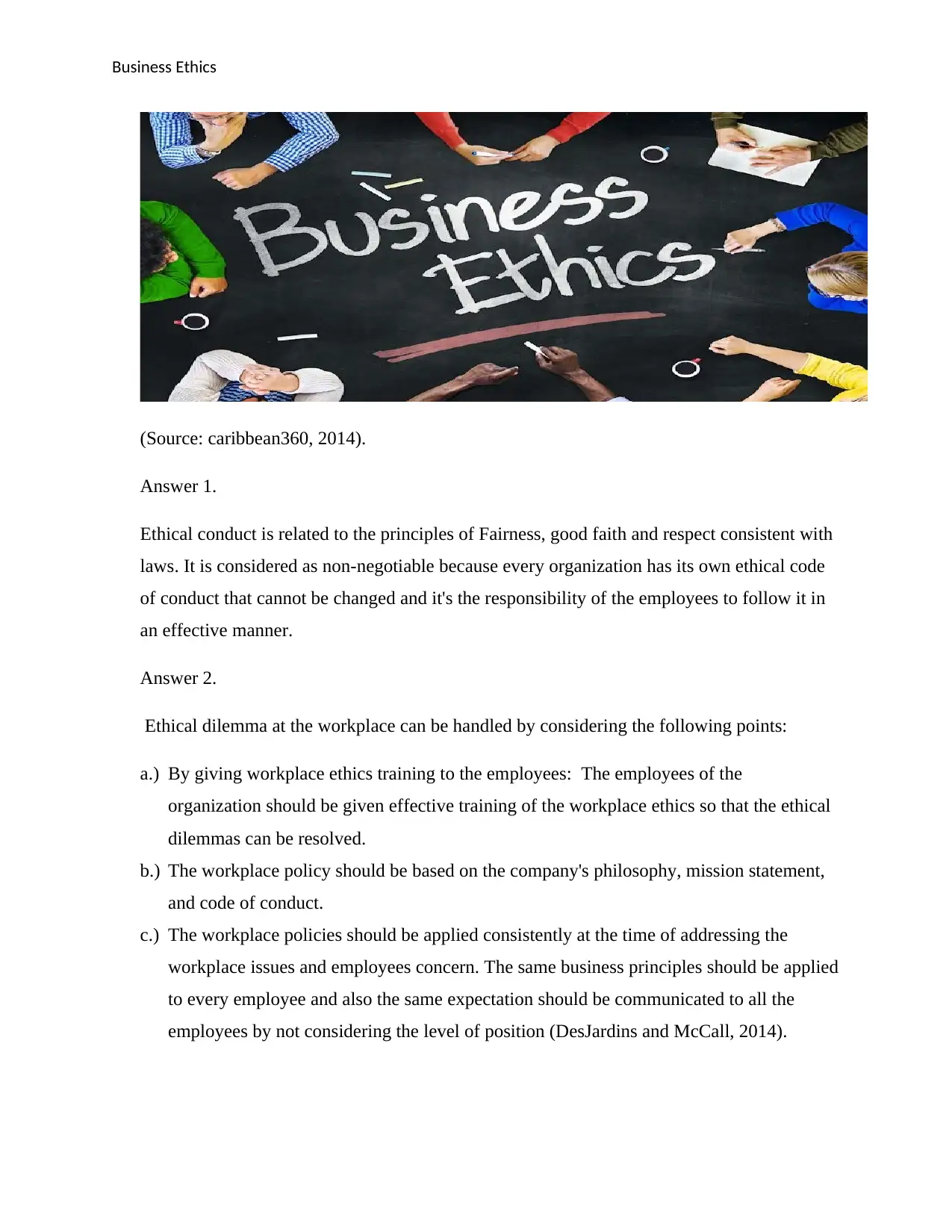
Business Ethics
(Source: caribbean360, 2014).
Answer 1.
Ethical conduct is related to the principles of Fairness, good faith and respect consistent with
laws. It is considered as non-negotiable because every organization has its own ethical code
of conduct that cannot be changed and it's the responsibility of the employees to follow it in
an effective manner.
Answer 2.
Ethical dilemma at the workplace can be handled by considering the following points:
a.) By giving workplace ethics training to the employees: The employees of the
organization should be given effective training of the workplace ethics so that the ethical
dilemmas can be resolved.
b.) The workplace policy should be based on the company's philosophy, mission statement,
and code of conduct.
c.) The workplace policies should be applied consistently at the time of addressing the
workplace issues and employees concern. The same business principles should be applied
to every employee and also the same expectation should be communicated to all the
employees by not considering the level of position (DesJardins and McCall, 2014).
(Source: caribbean360, 2014).
Answer 1.
Ethical conduct is related to the principles of Fairness, good faith and respect consistent with
laws. It is considered as non-negotiable because every organization has its own ethical code
of conduct that cannot be changed and it's the responsibility of the employees to follow it in
an effective manner.
Answer 2.
Ethical dilemma at the workplace can be handled by considering the following points:
a.) By giving workplace ethics training to the employees: The employees of the
organization should be given effective training of the workplace ethics so that the ethical
dilemmas can be resolved.
b.) The workplace policy should be based on the company's philosophy, mission statement,
and code of conduct.
c.) The workplace policies should be applied consistently at the time of addressing the
workplace issues and employees concern. The same business principles should be applied
to every employee and also the same expectation should be communicated to all the
employees by not considering the level of position (DesJardins and McCall, 2014).
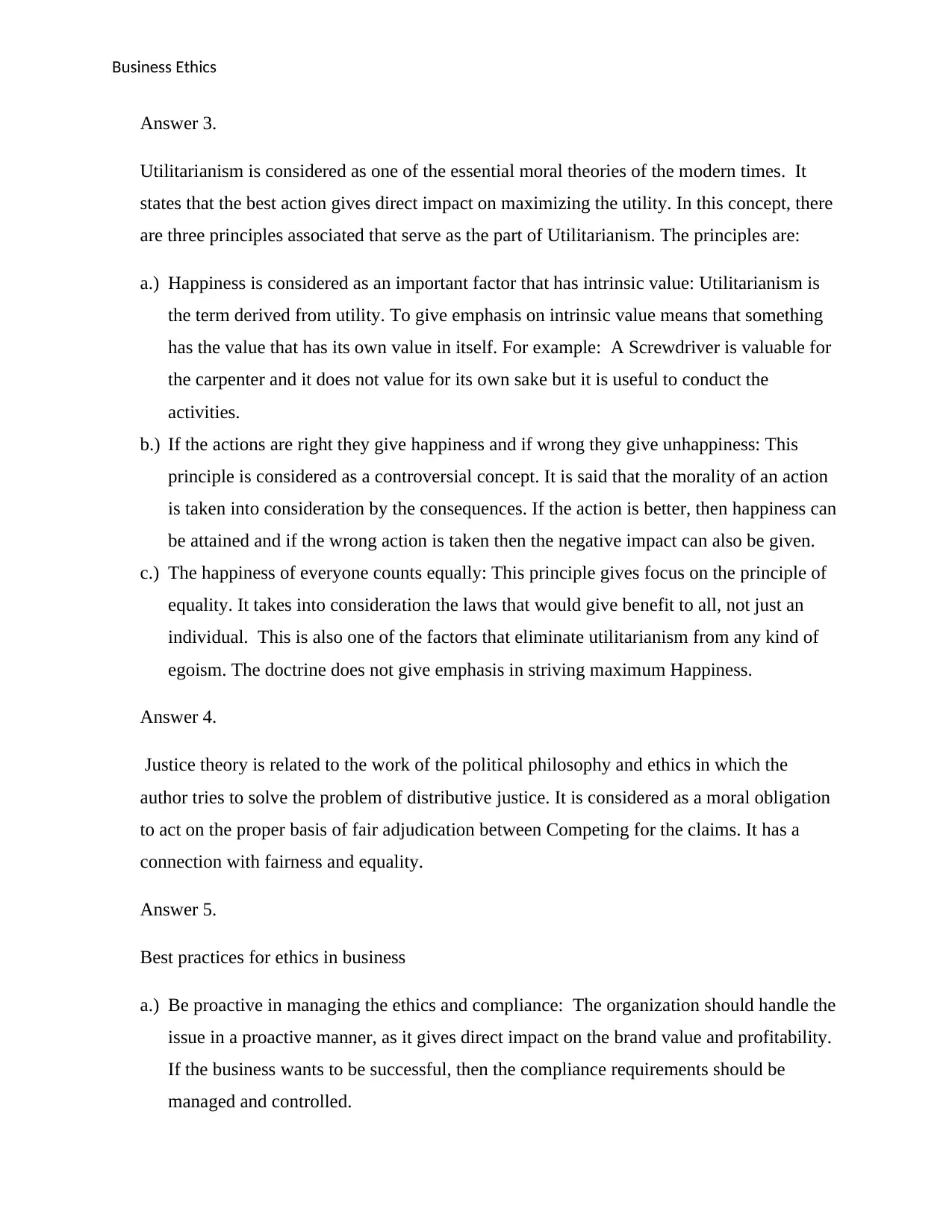
Business Ethics
Answer 3.
Utilitarianism is considered as one of the essential moral theories of the modern times. It
states that the best action gives direct impact on maximizing the utility. In this concept, there
are three principles associated that serve as the part of Utilitarianism. The principles are:
a.) Happiness is considered as an important factor that has intrinsic value: Utilitarianism is
the term derived from utility. To give emphasis on intrinsic value means that something
has the value that has its own value in itself. For example: A Screwdriver is valuable for
the carpenter and it does not value for its own sake but it is useful to conduct the
activities.
b.) If the actions are right they give happiness and if wrong they give unhappiness: This
principle is considered as a controversial concept. It is said that the morality of an action
is taken into consideration by the consequences. If the action is better, then happiness can
be attained and if the wrong action is taken then the negative impact can also be given.
c.) The happiness of everyone counts equally: This principle gives focus on the principle of
equality. It takes into consideration the laws that would give benefit to all, not just an
individual. This is also one of the factors that eliminate utilitarianism from any kind of
egoism. The doctrine does not give emphasis in striving maximum Happiness.
Answer 4.
Justice theory is related to the work of the political philosophy and ethics in which the
author tries to solve the problem of distributive justice. It is considered as a moral obligation
to act on the proper basis of fair adjudication between Competing for the claims. It has a
connection with fairness and equality.
Answer 5.
Best practices for ethics in business
a.) Be proactive in managing the ethics and compliance: The organization should handle the
issue in a proactive manner, as it gives direct impact on the brand value and profitability.
If the business wants to be successful, then the compliance requirements should be
managed and controlled.
Answer 3.
Utilitarianism is considered as one of the essential moral theories of the modern times. It
states that the best action gives direct impact on maximizing the utility. In this concept, there
are three principles associated that serve as the part of Utilitarianism. The principles are:
a.) Happiness is considered as an important factor that has intrinsic value: Utilitarianism is
the term derived from utility. To give emphasis on intrinsic value means that something
has the value that has its own value in itself. For example: A Screwdriver is valuable for
the carpenter and it does not value for its own sake but it is useful to conduct the
activities.
b.) If the actions are right they give happiness and if wrong they give unhappiness: This
principle is considered as a controversial concept. It is said that the morality of an action
is taken into consideration by the consequences. If the action is better, then happiness can
be attained and if the wrong action is taken then the negative impact can also be given.
c.) The happiness of everyone counts equally: This principle gives focus on the principle of
equality. It takes into consideration the laws that would give benefit to all, not just an
individual. This is also one of the factors that eliminate utilitarianism from any kind of
egoism. The doctrine does not give emphasis in striving maximum Happiness.
Answer 4.
Justice theory is related to the work of the political philosophy and ethics in which the
author tries to solve the problem of distributive justice. It is considered as a moral obligation
to act on the proper basis of fair adjudication between Competing for the claims. It has a
connection with fairness and equality.
Answer 5.
Best practices for ethics in business
a.) Be proactive in managing the ethics and compliance: The organization should handle the
issue in a proactive manner, as it gives direct impact on the brand value and profitability.
If the business wants to be successful, then the compliance requirements should be
managed and controlled.
⊘ This is a preview!⊘
Do you want full access?
Subscribe today to unlock all pages.

Trusted by 1+ million students worldwide
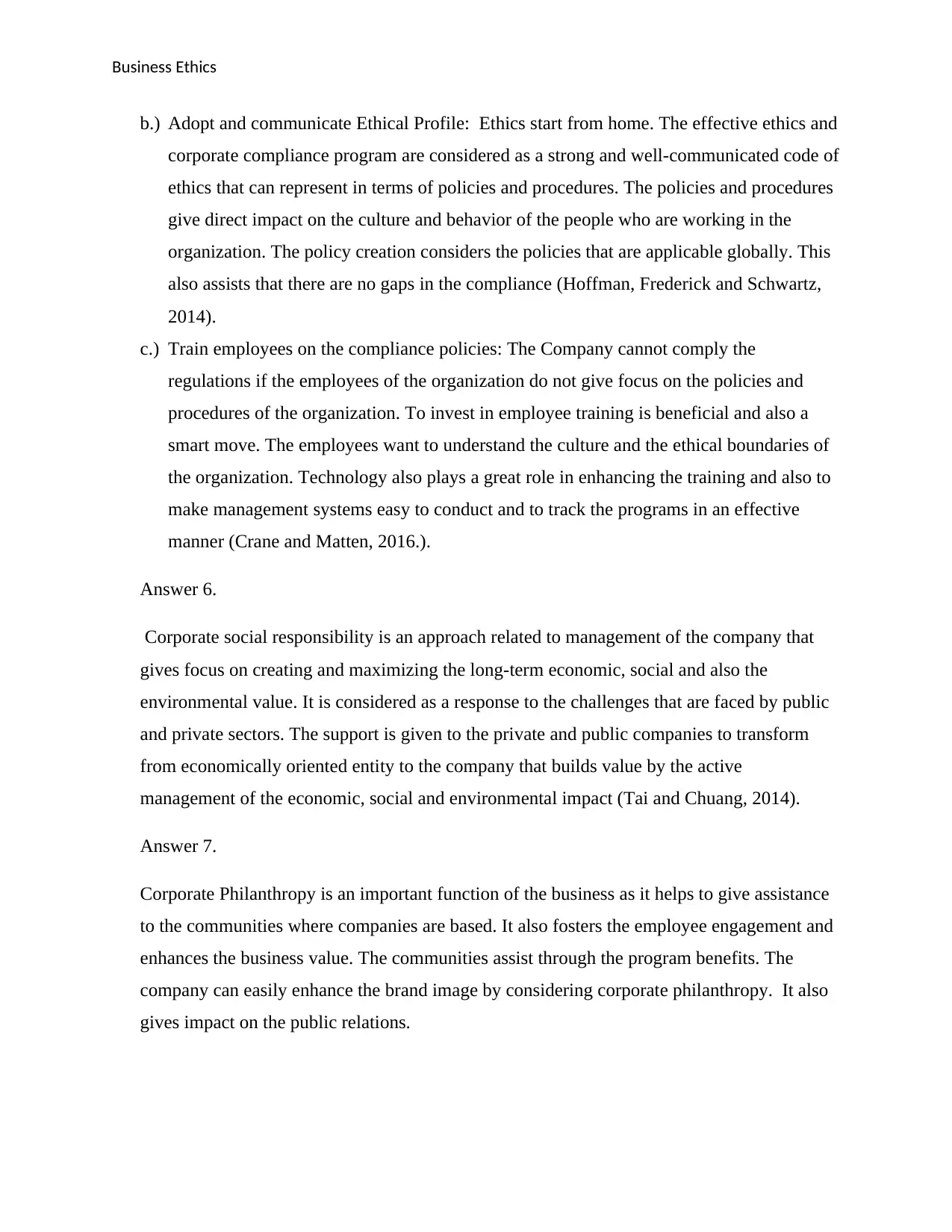
Business Ethics
b.) Adopt and communicate Ethical Profile: Ethics start from home. The effective ethics and
corporate compliance program are considered as a strong and well-communicated code of
ethics that can represent in terms of policies and procedures. The policies and procedures
give direct impact on the culture and behavior of the people who are working in the
organization. The policy creation considers the policies that are applicable globally. This
also assists that there are no gaps in the compliance (Hoffman, Frederick and Schwartz,
2014).
c.) Train employees on the compliance policies: The Company cannot comply the
regulations if the employees of the organization do not give focus on the policies and
procedures of the organization. To invest in employee training is beneficial and also a
smart move. The employees want to understand the culture and the ethical boundaries of
the organization. Technology also plays a great role in enhancing the training and also to
make management systems easy to conduct and to track the programs in an effective
manner (Crane and Matten, 2016.).
Answer 6.
Corporate social responsibility is an approach related to management of the company that
gives focus on creating and maximizing the long-term economic, social and also the
environmental value. It is considered as a response to the challenges that are faced by public
and private sectors. The support is given to the private and public companies to transform
from economically oriented entity to the company that builds value by the active
management of the economic, social and environmental impact (Tai and Chuang, 2014).
Answer 7.
Corporate Philanthropy is an important function of the business as it helps to give assistance
to the communities where companies are based. It also fosters the employee engagement and
enhances the business value. The communities assist through the program benefits. The
company can easily enhance the brand image by considering corporate philanthropy. It also
gives impact on the public relations.
b.) Adopt and communicate Ethical Profile: Ethics start from home. The effective ethics and
corporate compliance program are considered as a strong and well-communicated code of
ethics that can represent in terms of policies and procedures. The policies and procedures
give direct impact on the culture and behavior of the people who are working in the
organization. The policy creation considers the policies that are applicable globally. This
also assists that there are no gaps in the compliance (Hoffman, Frederick and Schwartz,
2014).
c.) Train employees on the compliance policies: The Company cannot comply the
regulations if the employees of the organization do not give focus on the policies and
procedures of the organization. To invest in employee training is beneficial and also a
smart move. The employees want to understand the culture and the ethical boundaries of
the organization. Technology also plays a great role in enhancing the training and also to
make management systems easy to conduct and to track the programs in an effective
manner (Crane and Matten, 2016.).
Answer 6.
Corporate social responsibility is an approach related to management of the company that
gives focus on creating and maximizing the long-term economic, social and also the
environmental value. It is considered as a response to the challenges that are faced by public
and private sectors. The support is given to the private and public companies to transform
from economically oriented entity to the company that builds value by the active
management of the economic, social and environmental impact (Tai and Chuang, 2014).
Answer 7.
Corporate Philanthropy is an important function of the business as it helps to give assistance
to the communities where companies are based. It also fosters the employee engagement and
enhances the business value. The communities assist through the program benefits. The
company can easily enhance the brand image by considering corporate philanthropy. It also
gives impact on the public relations.
Paraphrase This Document
Need a fresh take? Get an instant paraphrase of this document with our AI Paraphraser
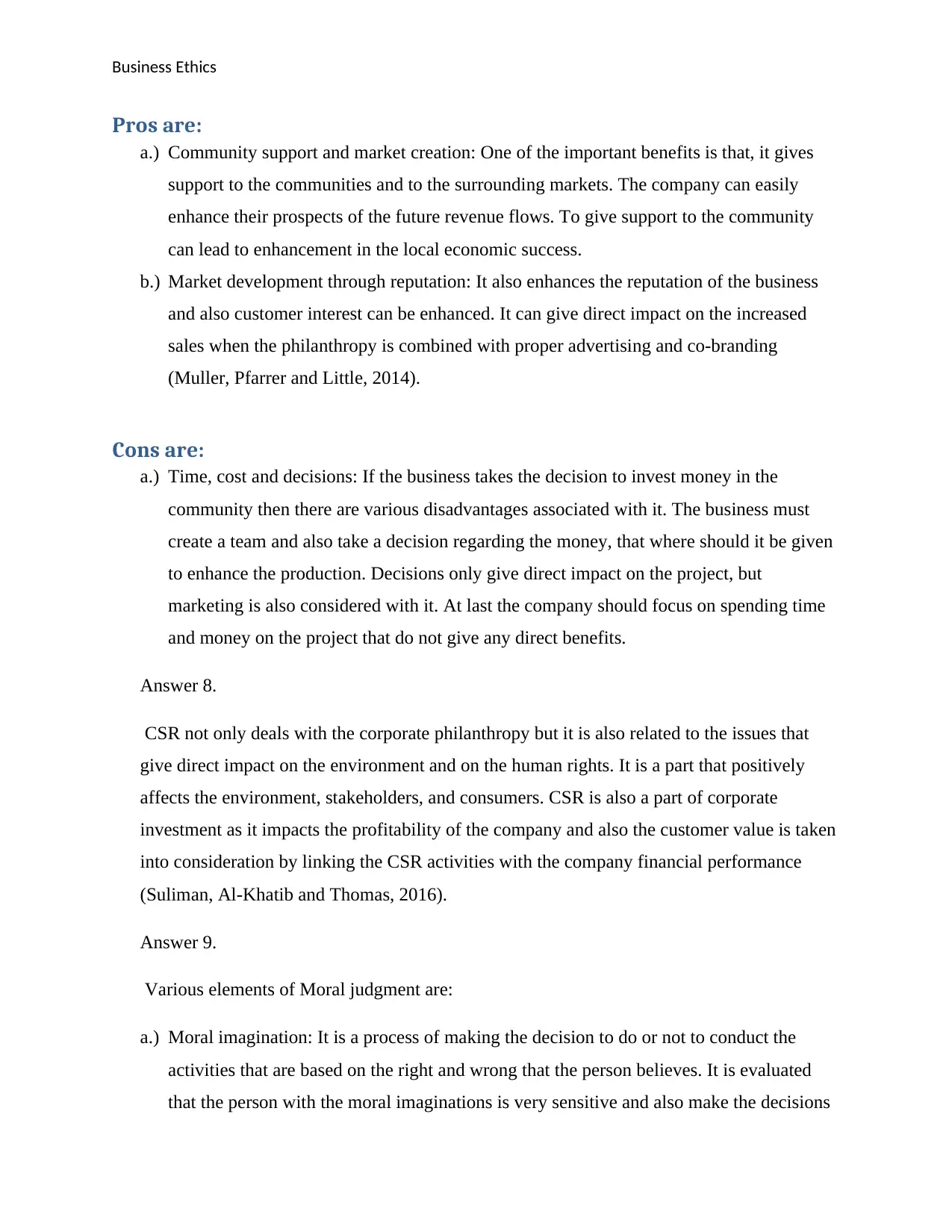
Business Ethics
Pros are:
a.) Community support and market creation: One of the important benefits is that, it gives
support to the communities and to the surrounding markets. The company can easily
enhance their prospects of the future revenue flows. To give support to the community
can lead to enhancement in the local economic success.
b.) Market development through reputation: It also enhances the reputation of the business
and also customer interest can be enhanced. It can give direct impact on the increased
sales when the philanthropy is combined with proper advertising and co-branding
(Muller, Pfarrer and Little, 2014).
Cons are:
a.) Time, cost and decisions: If the business takes the decision to invest money in the
community then there are various disadvantages associated with it. The business must
create a team and also take a decision regarding the money, that where should it be given
to enhance the production. Decisions only give direct impact on the project, but
marketing is also considered with it. At last the company should focus on spending time
and money on the project that do not give any direct benefits.
Answer 8.
CSR not only deals with the corporate philanthropy but it is also related to the issues that
give direct impact on the environment and on the human rights. It is a part that positively
affects the environment, stakeholders, and consumers. CSR is also a part of corporate
investment as it impacts the profitability of the company and also the customer value is taken
into consideration by linking the CSR activities with the company financial performance
(Suliman, Al-Khatib and Thomas, 2016).
Answer 9.
Various elements of Moral judgment are:
a.) Moral imagination: It is a process of making the decision to do or not to conduct the
activities that are based on the right and wrong that the person believes. It is evaluated
that the person with the moral imaginations is very sensitive and also make the decisions
Pros are:
a.) Community support and market creation: One of the important benefits is that, it gives
support to the communities and to the surrounding markets. The company can easily
enhance their prospects of the future revenue flows. To give support to the community
can lead to enhancement in the local economic success.
b.) Market development through reputation: It also enhances the reputation of the business
and also customer interest can be enhanced. It can give direct impact on the increased
sales when the philanthropy is combined with proper advertising and co-branding
(Muller, Pfarrer and Little, 2014).
Cons are:
a.) Time, cost and decisions: If the business takes the decision to invest money in the
community then there are various disadvantages associated with it. The business must
create a team and also take a decision regarding the money, that where should it be given
to enhance the production. Decisions only give direct impact on the project, but
marketing is also considered with it. At last the company should focus on spending time
and money on the project that do not give any direct benefits.
Answer 8.
CSR not only deals with the corporate philanthropy but it is also related to the issues that
give direct impact on the environment and on the human rights. It is a part that positively
affects the environment, stakeholders, and consumers. CSR is also a part of corporate
investment as it impacts the profitability of the company and also the customer value is taken
into consideration by linking the CSR activities with the company financial performance
(Suliman, Al-Khatib and Thomas, 2016).
Answer 9.
Various elements of Moral judgment are:
a.) Moral imagination: It is a process of making the decision to do or not to conduct the
activities that are based on the right and wrong that the person believes. It is evaluated
that the person with the moral imaginations is very sensitive and also make the decisions
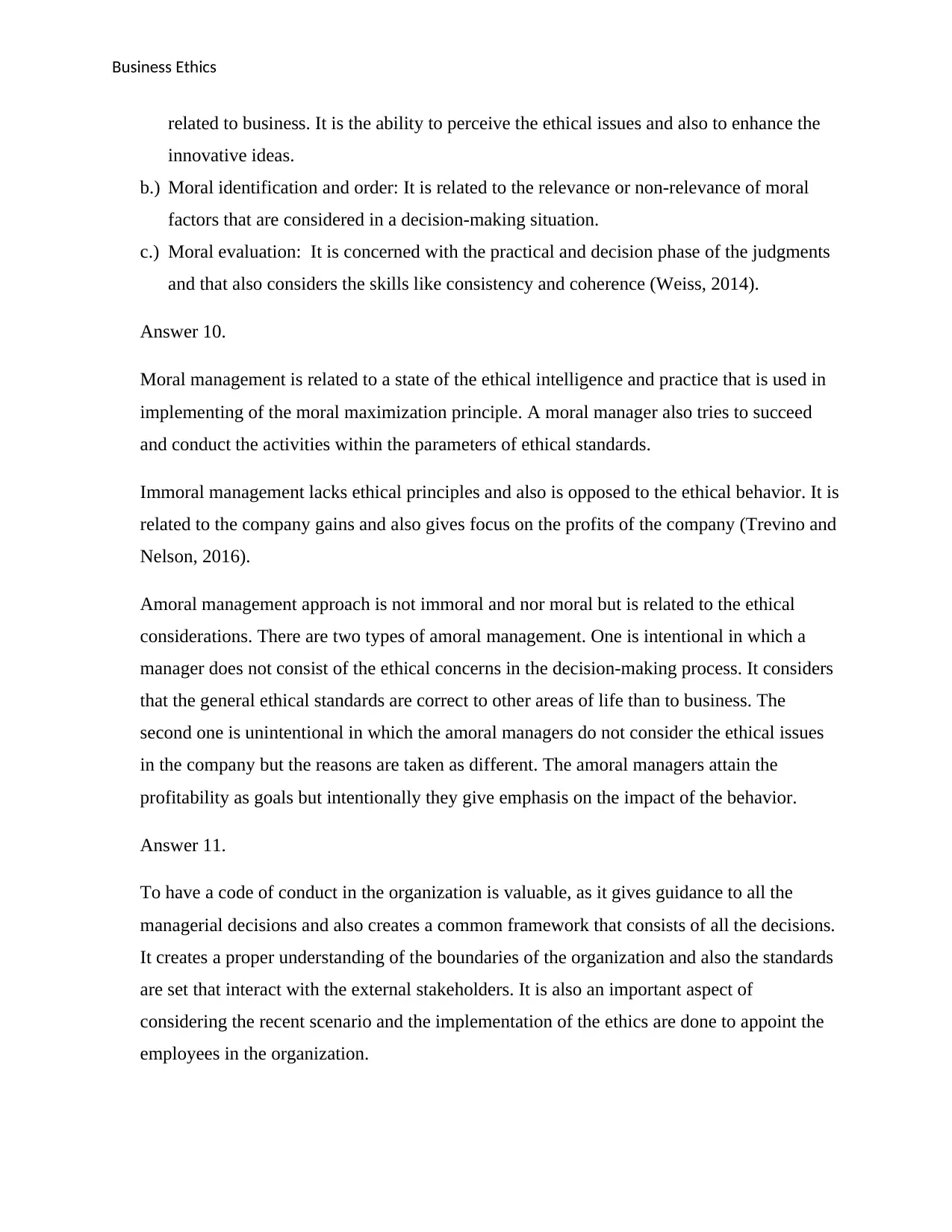
Business Ethics
related to business. It is the ability to perceive the ethical issues and also to enhance the
innovative ideas.
b.) Moral identification and order: It is related to the relevance or non-relevance of moral
factors that are considered in a decision-making situation.
c.) Moral evaluation: It is concerned with the practical and decision phase of the judgments
and that also considers the skills like consistency and coherence (Weiss, 2014).
Answer 10.
Moral management is related to a state of the ethical intelligence and practice that is used in
implementing of the moral maximization principle. A moral manager also tries to succeed
and conduct the activities within the parameters of ethical standards.
Immoral management lacks ethical principles and also is opposed to the ethical behavior. It is
related to the company gains and also gives focus on the profits of the company (Trevino and
Nelson, 2016).
Amoral management approach is not immoral and nor moral but is related to the ethical
considerations. There are two types of amoral management. One is intentional in which a
manager does not consist of the ethical concerns in the decision-making process. It considers
that the general ethical standards are correct to other areas of life than to business. The
second one is unintentional in which the amoral managers do not consider the ethical issues
in the company but the reasons are taken as different. The amoral managers attain the
profitability as goals but intentionally they give emphasis on the impact of the behavior.
Answer 11.
To have a code of conduct in the organization is valuable, as it gives guidance to all the
managerial decisions and also creates a common framework that consists of all the decisions.
It creates a proper understanding of the boundaries of the organization and also the standards
are set that interact with the external stakeholders. It is also an important aspect of
considering the recent scenario and the implementation of the ethics are done to appoint the
employees in the organization.
related to business. It is the ability to perceive the ethical issues and also to enhance the
innovative ideas.
b.) Moral identification and order: It is related to the relevance or non-relevance of moral
factors that are considered in a decision-making situation.
c.) Moral evaluation: It is concerned with the practical and decision phase of the judgments
and that also considers the skills like consistency and coherence (Weiss, 2014).
Answer 10.
Moral management is related to a state of the ethical intelligence and practice that is used in
implementing of the moral maximization principle. A moral manager also tries to succeed
and conduct the activities within the parameters of ethical standards.
Immoral management lacks ethical principles and also is opposed to the ethical behavior. It is
related to the company gains and also gives focus on the profits of the company (Trevino and
Nelson, 2016).
Amoral management approach is not immoral and nor moral but is related to the ethical
considerations. There are two types of amoral management. One is intentional in which a
manager does not consist of the ethical concerns in the decision-making process. It considers
that the general ethical standards are correct to other areas of life than to business. The
second one is unintentional in which the amoral managers do not consider the ethical issues
in the company but the reasons are taken as different. The amoral managers attain the
profitability as goals but intentionally they give emphasis on the impact of the behavior.
Answer 11.
To have a code of conduct in the organization is valuable, as it gives guidance to all the
managerial decisions and also creates a common framework that consists of all the decisions.
It creates a proper understanding of the boundaries of the organization and also the standards
are set that interact with the external stakeholders. It is also an important aspect of
considering the recent scenario and the implementation of the ethics are done to appoint the
employees in the organization.
⊘ This is a preview!⊘
Do you want full access?
Subscribe today to unlock all pages.

Trusted by 1+ million students worldwide
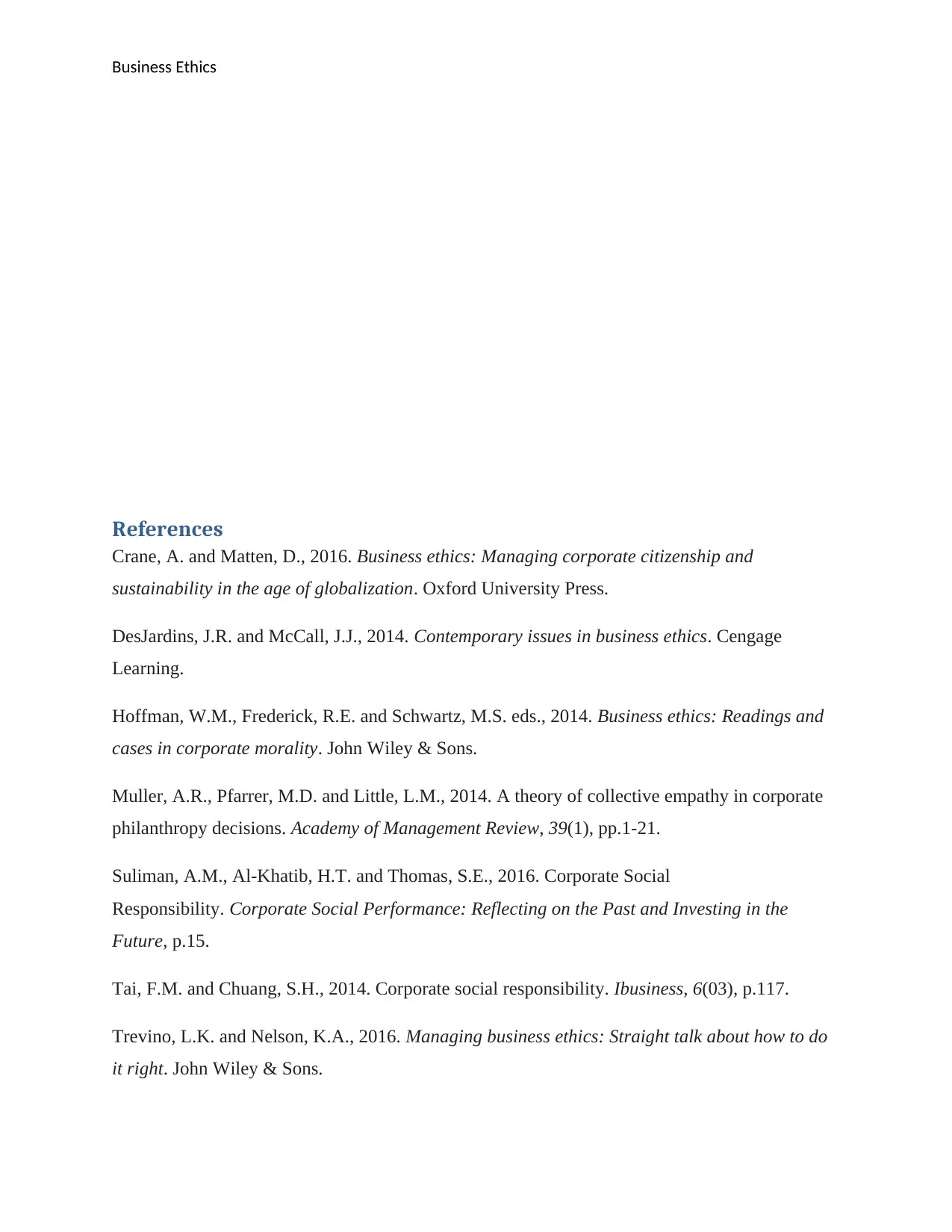
Business Ethics
References
Crane, A. and Matten, D., 2016. Business ethics: Managing corporate citizenship and
sustainability in the age of globalization. Oxford University Press.
DesJardins, J.R. and McCall, J.J., 2014. Contemporary issues in business ethics. Cengage
Learning.
Hoffman, W.M., Frederick, R.E. and Schwartz, M.S. eds., 2014. Business ethics: Readings and
cases in corporate morality. John Wiley & Sons.
Muller, A.R., Pfarrer, M.D. and Little, L.M., 2014. A theory of collective empathy in corporate
philanthropy decisions. Academy of Management Review, 39(1), pp.1-21.
Suliman, A.M., Al-Khatib, H.T. and Thomas, S.E., 2016. Corporate Social
Responsibility. Corporate Social Performance: Reflecting on the Past and Investing in the
Future, p.15.
Tai, F.M. and Chuang, S.H., 2014. Corporate social responsibility. Ibusiness, 6(03), p.117.
Trevino, L.K. and Nelson, K.A., 2016. Managing business ethics: Straight talk about how to do
it right. John Wiley & Sons.
References
Crane, A. and Matten, D., 2016. Business ethics: Managing corporate citizenship and
sustainability in the age of globalization. Oxford University Press.
DesJardins, J.R. and McCall, J.J., 2014. Contemporary issues in business ethics. Cengage
Learning.
Hoffman, W.M., Frederick, R.E. and Schwartz, M.S. eds., 2014. Business ethics: Readings and
cases in corporate morality. John Wiley & Sons.
Muller, A.R., Pfarrer, M.D. and Little, L.M., 2014. A theory of collective empathy in corporate
philanthropy decisions. Academy of Management Review, 39(1), pp.1-21.
Suliman, A.M., Al-Khatib, H.T. and Thomas, S.E., 2016. Corporate Social
Responsibility. Corporate Social Performance: Reflecting on the Past and Investing in the
Future, p.15.
Tai, F.M. and Chuang, S.H., 2014. Corporate social responsibility. Ibusiness, 6(03), p.117.
Trevino, L.K. and Nelson, K.A., 2016. Managing business ethics: Straight talk about how to do
it right. John Wiley & Sons.
Paraphrase This Document
Need a fresh take? Get an instant paraphrase of this document with our AI Paraphraser

Business Ethics
Weiss, J.W., 2014. Business ethics: A stakeholder and issues management approach. Berrett-
Koehler Publishers.
Weiss, J.W., 2014. Business ethics: A stakeholder and issues management approach. Berrett-
Koehler Publishers.
1 out of 8
Related Documents
Your All-in-One AI-Powered Toolkit for Academic Success.
+13062052269
info@desklib.com
Available 24*7 on WhatsApp / Email
![[object Object]](/_next/static/media/star-bottom.7253800d.svg)
Unlock your academic potential
Copyright © 2020–2026 A2Z Services. All Rights Reserved. Developed and managed by ZUCOL.





